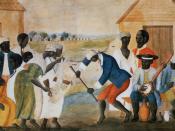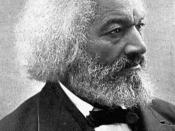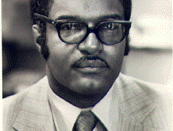Katie B
Review of John Blassingame's The Slave Community
John W. Blassingame was born in Covington, Georgia, in 1940. Blassingame joined the faculty of Yale University in 1970, where he taught in the African American Studies, History and African departments. He chaired African American Studies for most of the 1980's. He is the author of New Perspectives on Black Studies (1971), Black New Orleans, 1860-1880 (1973), and The Slave Community: Plantation Life in the Antebellum South (1972). Blassingame was also the editor of the Papers of Frederick Douglass in the mid-1970's. He has a Bachelor's Degree from Fort Valley State College, a Master's Degree from Howard University, and a Ph.D. from Yale. He passed away in February 2000, and is survived by his father, Grady Blassingame, his wife Teasie, and his two children, Tia and John.
In The Slave Community, Blassingame argues that despite their physical enslavement, African Americans avoided psychological enslavement and retained their culture through language, names and proverbs; a link with the past; customs, courtship and familial roles; music, dancing, acting and storytelling; and Southern planters' adaptation of their religion and customs to suit their slaves.
To support his thesis, Blassingame pored through periodicals, personal letters, hymnals, birth and death records, autobiographies and diaries, church records, receipts, plantation records, travel accounts and agricultural almanacs.
A major way that slaves retained their culture was through their language. Despite the fact that slaveholders frequently named children born to their slaves, slave parents often gave their children traditional African names such as Abbrom or Golaga. Slaves new to America often began to speak a combination of their native language and English. Slaves often gave objects and concepts new English names to facilitate their understanding of them, such as "a-beat-on-iron" for a mechanical device or "day clean" for...


